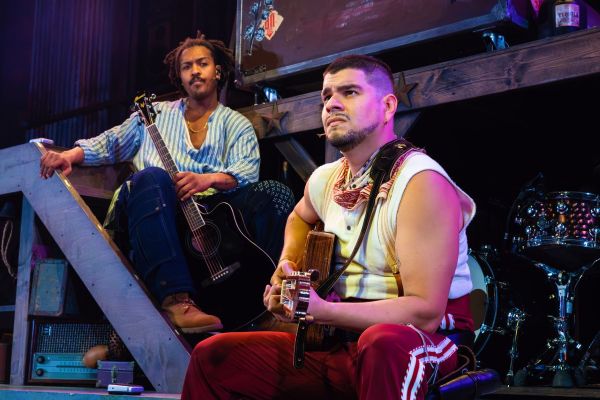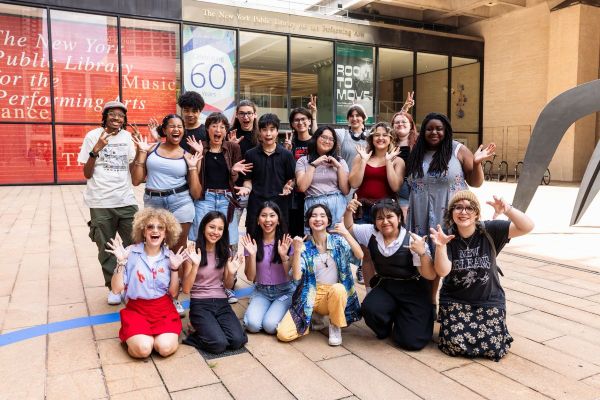When Mira (a 26-year-old bi-racial Korean American classical violinist) and her boyfriend Beckett (who plays multiple acoustic string instruments, sings, and is a wealth of information about the vintage bluegrass he studies and collects) decide to escape from the pandemic lockdown in their apartment in Brooklyn and go on a road trip down south for him to conduct research for his PhD on the multi-cultural roots of American folk music, his old camper breaks down. Again. They realize they’ll miss the hootenanny they were heading to, so she suggests they go to one in Windy Hill, North Carolina, just a few miles away. They do, and there on stage she unexpectedly (or not) sees her widowed grandfather Edgar Wilson, an electrician by trade and a well-known banjo player and singer of old-time folk and bluegrass, from whom she and her mother Ruth (his daughter) have been estranged for eighteen years (a fact she never mentioned to Beck). Edgar, or Gar, as he prefers to be called, invites them back to her childhood home, where they join together in music on the porch and revisit the past – both the beloved memories they share and the attitudes and incidents that tore them apart – in The Porch on Windy Hill: a new play with old music, written by Sherry Stregack Lutken (who conceived the work and directs), Lisa Helmi Johanson, Morgan Morse, and David M. Lutken (the four of whom also contributed the orchestrations and arrangements of the songs), and now making its NYC debut in a limited engagement at Urban Stages.
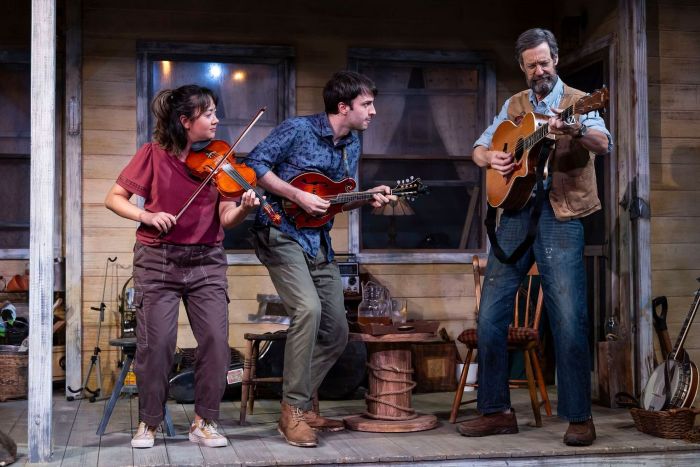
Set in 2021, in the titular fictional town by the Blue Ridge Mountains, the narrative of the damaged and dysfunctional family, their hurt and anger, is interspersed between lively foot-stomping performances of traditional Appalachian folk songs that trigger the characters’ conversations and reminiscences, confrontations and reconnection. The three-hander takes place over the course of one initially awkward, increasingly pivotal day and night, until Mira and Beck head out the next morning from Gar’s, where they were invited to sleep over in Ruth’s former bedroom, after gaining a new understanding of each other’s pain, the healing power of music, and the growing prospect of harmony in their relationships, as in the songs they mutually love.
Through their journey, the show explores the important themes of bigotry, loss, and reconciliation, with a combination of humor and introspection, generational and cultural clashes, and performances that embody the experiences and perspectives of the three, noting that Gar, who adored the little Mira (named for her late grandmother Elmira) but was not accepting of her Korean father and did nothing to stop a cousin’s racist attack on her as a child, was “a product of his time and place.” It also considers the impact of the Vietnam War on the prejudice of Gar, who enlisted and served there, as well as the more recent anti-Asian attacks that occurred during the COVID pandemic, when the play is set and was written.
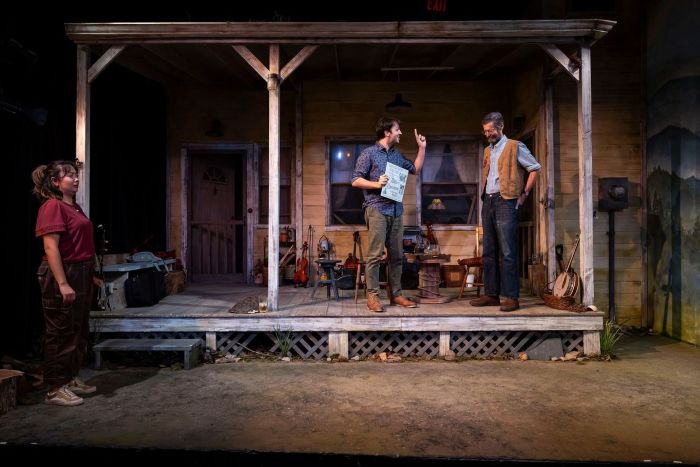
Starring the masterful writers/performers David M. Lutken as Gar and Morgan Morse as Beck, along with Tora Nogami Alexander as Mira, the multi-talented cast delivers the full-out emotions, tensions, distinctive personalities, accents, and dialects of their characters (e.g., Gar says “hootenanny” is a Yankee word, they call it “pickin’ parties,” and he’s happy to hear Mira, who’s spent the last two decades up north, say “y’all” and call dinner “supper”), joining in on the familiar songs and accompanying themselves on a full array of traditional instruments, playing everything from a banjo, mandolin, violin, guitar, dulcimer, harmonica, and erhu – each of which, as observed by the extremely knowledgeable Beck, who is giddy over getting to meet Gar, one of the famed musicians on a vinyl album he owns, and to hear about his associations with many bluegrass stars – originated in a different country and was appropriated by others, resulting in an ever-evolving cultural mix. The wry Gar, on the other hand, is not so open to change and prefers things the way they are in the old south and its music. But as the three get to know each other, consume bottles of beer and shots of the local moonshine, reveal their feelings (sometimes explosively, in the case of Mira and Beck), and share their love of the songs, he becomes less set in his ways and more inclined to make amends for the past, as suggested in the poignant closing scene.
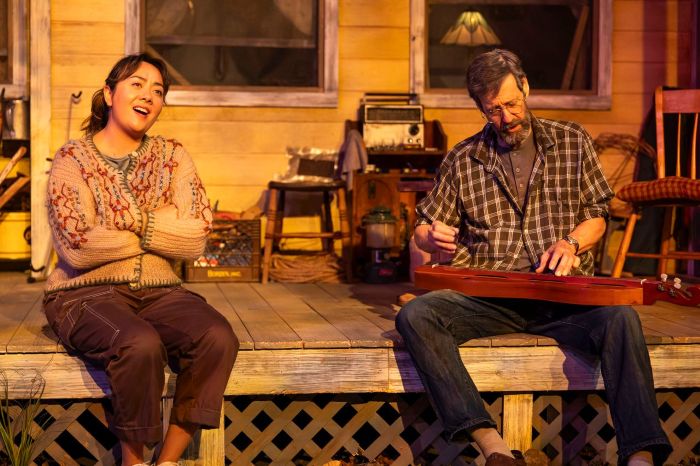
A telling artistic design transports us to the downhome locale and defines the individual characters. The eponymous junk-filled front porch of Gar’s old tumbledown house dominates the stationary set (by Andrew Robinson), with a landscape painting of the mountains to the right of the stage, a sleeping bag and backpack on a lower downstage level to represent the campsite where Mira and Beck uncomfortably slept, and a folding chair to the right, where Gar is seated and playing his music to indicate the pickin’ party at the local church, all enhanced with ambient sound (by Sun Hee Kil). Lighting (by John Salutz) shifts with the times of day, into the night and the following morning, and shines a spotlight on the featured performers. And the casual costumes (by Grace Jeon) capture Gar’s old country wear, the more current look of Mira, and the hipster style of Beck (called a “hippie” by the less-than-up-to-date Gar).
The Porch on Windy Hill is a must-see for fans of the old-time bluegrass music that drives the show and renders it more of music with a play than a play with music. The cast will extend the musical celebration for the next three Sundays, performing at the nearby American Whiskey after the matinee; entry is free and you are invited to bring a string instrument to play along.
Running Time: Approximately two hours and 10 minutes, including an intermission.
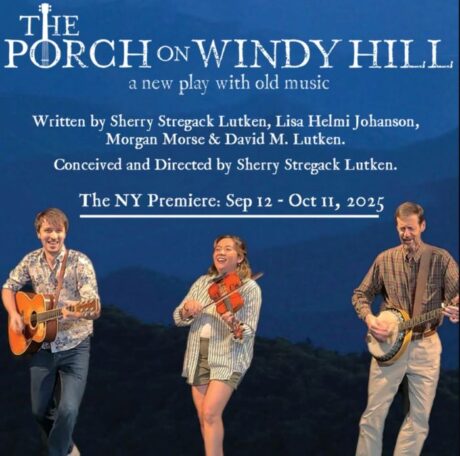
The Porch on Windy Hill plays through Saturday, October 11, 2025, at Urban Stages, 259 W 30th Street, NYC. For tickets (priced at $41.80, including fees), go online.


